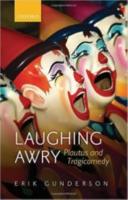
OUP (2015) 283pp £54 (ISBN 978 0198729303)
Make no mistake—this book is a serious and very scholarly work, aimed at readers who already know ancient comic criticism well. As such, despite a breezy, conversational style, which grew on this reviewer, it wears its learning quite heavily. G. is the author of useful volumes on ancient rhetoric and one can detect this in his exegesis.
The book is an examination in depth of the plays of Plautus, their disputed origin and their audience, as well as a wide-ranging examination of the purpose and effects of comedy. One struggles, to be frank, to get through the introductory chapter, especially if Lacan is a closed book, or at least a half-open one (G.’s style is catching.). However, the second chapter, on the identification of Plautus’ and ‘Plautine’ drama, is thought-provoking, full of insight and originality, and crammed with extensive and useful footnotes, mirroring an equally impressive bibliography. There is also a Subject Index and an Index of Passages.
G. then gives us a number of breezy chapters with knowing and witty headings: Giving Words, Object Lessons, The Last Laugh, etc. Each focuses on one or two revelatory scenes from different plays and here G. comes into his own. He writes confidently and with great experience; there are fascinating aperçus, some of which have already sent me back to reread the plays. The style is knowing, comical in itself (When Juris met Prudence) and full of information, but there are curious links, such as a mention of Cicero in Cilicia (on p. 94), to illustrate the theatrical quality of Republican life. A reference to the very different res publica of Plautus’ own time might have been more to the point.
The book impresses particularly in chapters 6-8, those on Pseudolus, Amphitruo and Epidicus, all brilliant and incisive. But here too, G. brings in David Lynch’s Rabbits in an attempt to elucidate the ‘poor’ Epidicus. But perhaps it’s just second-rate.
This is the most stimulating book I have read for some time, so it is dispiriting to report a large number of careless misprints and mistakes—see, e.g., the reference to the epitaph of Scipio on p. 103: misprint, mistranslation and misquotation (of a French commentary), all in a few lines. Disappointing, especially in an expensive work.
Terry Walsh—Ratcliffe College
